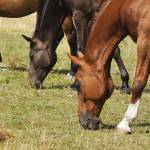Calculating Pasture and Forage Consumption of Horses

Healthy mature horses should consume between 1.5 and 2% of their body weight per day in forage (hay, haylage, hay cubes), pasture, or a combination thereof. When given access to pasture, how can you tell how much your horse is actually consuming and whether or not supplemental hay should be offered?
“As a general rule of thumb, horses on pasture eat about 1-2 lb (0.45-0.9 kg) of pasture dry matter per hour. An average horse on pasture 24 hours a day will graze for about 16 hours, meaning that they can consume 16-32 lb (7-15 kg) of pasture. This is equivalent to 1.6-3.2% of body weight per day for an average 1,000-lb (450-kg) horse,” said Kathleen Crandell, Ph.D., a Kentucky Equine Research nutritionist.
Horses turned out for half the day consume approximately 1% of their body weight, or 10 lb (4.5 kg) of forage for an average 1,000-lb (450-kg) horse. These animals will therefore require approximately 10 lb (4.5 kg) of supplemental hay to maintain an appropriate body condition score.
In other words, most horses can meet their dry matter intake requirements when on pasture, assuming a limitless supply of pasture is available, which is often not the case.
Pastures that are overgrazed or drought-stricken will not supply sufficient calories for horses to maintain condition. Further, pastures simply do not grow in many geographical regions in the fall and winter. In any of these scenarios, horses should be fed as if they had no access to pasture at all.
Feeding horses maintained in such conditions will require:
- Offering an appropriate amount of hay, haylage, hay cubes, or other forage daily. Good-quality round bales are appropriate for some horses but not all. They are not suitable, for example, for horses with compromised breathing or respiratory disease;
- Providing supplemental energy (calories) if horses are struggling to maintain a moderate body condition score of 5 or 6;
- Allowing consumption of fresh, not frozen or iced, water; and
- Ensuring access to salt (loose or a white block).
“If only hay can be fed and if the horse is an easy keeper, a vitamin and mineral supplement may be all that is needed to balance out the nutrients that are low or missing in the forage. For horses that need more calories than what can be provided through forage, a concentrate feed with a higher daily feeding rate may be more appropriate,” recommended Crandell.








